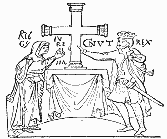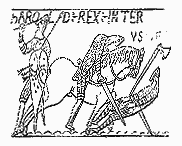In the Footsteps of Alfred the Great
Following the death of Alfred the Great his son Edward "the Elder" and his grandson Aethelstan won a series of victories that extended the power of Wessex north as far as present-day Scotland. Aethelstan could afford to call himself "King of the Anglo-Saxons and the Danes". Unfortunately, this was still a time when personal loyalty to a successful warrior king counted more than anything else. Dynasties were rare, and no realm was strong or stable independent of its leader. England was about to be saddled with a weak leader at just the wrong time.
Ethelred the Unready
The leader's name was Ethelred, and, in an unfortunate misunderstanding of an Anglo-Saxon pun, history has saddled him with the soubriquet, "The Unready". The original term for Ethelred was "un raed", which translates as "no council". It is possibly a play on his name, which is composed of the terms "aethel raed", or "noble council". In any case he was not well thought of even during his own reign, when it was not good politics to directly criticize a king. One chronicler, writing a century later, called the king "eager and admirably fitted for sleeping."
The Danegeld
Why the bad press? Ethelred came to the throne at the age of ten when his mother had his half-brother Edward murdered, and things went downhill from there. In the 980s a fresh wave of Danish raids began, and in the next decade, armies under Norwegian and Swedish kings did their ravaging bit. London was attacked and survived, but the surrounding countryside was hit hard. In 991 the fateful decision was made to buy off the raiders with a large payment.
This payment, or Danegeld as it came to be known, set a dangerous precedent. Now the Danes knew that there was good money to be had just for showing up. And each time the payment got bigger, from 10,000 pounds in 991 to a high of 82,500 pounds in 1018.
The Danes, under Swein Forkbeard, were a constant threat. In 1013 they became more than a threat. They sailed up the Trent and established a base at Gainsborough. From there Swein forced the submissions of first the north, then the southern kingdoms. Ethelred fled to Normandy, only to return the following year when Swein died.

Canute
The trouble was that Swein had a son, named Canute (or Cnut), who proved as difficult to deal with as his father. Canute defeated Ethelred, who improved matters by dying shortly thereafter.
His son, Edmund ("Ironside", for his battle prowess), carried on the scrap for a short time before he, too, died, perhaps assassinated by Canute. So the acclaimed new ruler of all England was a Dane who was also king of Denmark and Norway. He did his best to keep the peace in his new kingdom by using English councillors and upholding the traditional laws and customs. He married Edmund's widow and allied himself closely with the Christian church. He tried to make loyalty to his person and loyalty to the Church one and the same.
When Canute died in 1035, however, the same old dynastic squabbles broke out, with the eventual result that Edward, Ethelred's surviving son, was called back from exile in Normandy to rule.
Edward the Confessor
Edward, later to be called "Edward the Confessor" for his religious outlook, had lived in Normandy for 25 years in exile. He was Norman in his outlook and he appointed Norman councillors and church leaders. He is chiefly remembered as being the founder of Westminster Abbey. The site of the abbey is now a part of Greater London, but it was then an isolated patch of land beside the Thames. The court was moved to Westminster to be close to the works. This separation of court and city became a problem in later years when London tended to be in the forefront of insurrection and anti-royalist sentiment.
Edward's Heirs
Edward approached old age without a son to succeed him. In the interests of continuity, he was expected to name an heir. The two chief candidates were Harold Godwinson, a prominent earl, and William, Duke of Normandy. There is no sign that Edward had actually promised the throne to William. Harold made a better choice politically within the realm. There is a story that Harold had sworn an oath, which he later claimed was taken under duress, to defer in favour of William. However it may have happened, Edward named Harold as his heir.
King Harold's beginning...
Edward died on 5 January 1066. On the same day, Harold was crowned king in Westminster Abbey, which had itself only been consecrated eight days previously. He must have known he would be in for a rough spell, and he was. Duke William amassed an invasion fleet, and Harold was ready.
As luck or providence would have it, a spell of bad weather kept the invasion fleet from sailing for so long that Harold had no choice but to send home his levied troops, who owed him only a limited amount of service, and put his own fleet into port at London. Then word came of an invasion in the north by Harald Hardrada, King of Norway. It never rains but it pours.
...and his end
Harold marched north with his own personal army and defeated the Norwegians at Stamford Bridge. The wind chose that moment to subside and Duke William's fleet was able to make an unopposed crossing to the English shore near Hastings, in Sussex. Back again marched Harold with his tired troops. They met the Normans on Senlac Hill, near the town now called Battle, and in a near run thing, the Norman knights defeated the battle-axe wielding English.

The Norman Triumph
It was thought for some time that the tide turned after Harold was killed by an arrow in the eye. This information is culled from the Bayeux Tapestry, a weaving organised by William's wife telling the tale of the Conquest.
A closer look at the Tapestry, however, reveals that the man with the arrow in his eye may not be Harold after all, but a Saxon lord. Another myth of history exploded. With the defeat of Harold, the Dark Ages come officially to an end. They were not so dark as they were a time of great tumult and constant change, instability and internecine warfare. Now it was the turn of the Normans.
Related:
Battle of Hastings
More about Anglo-Saxon England

